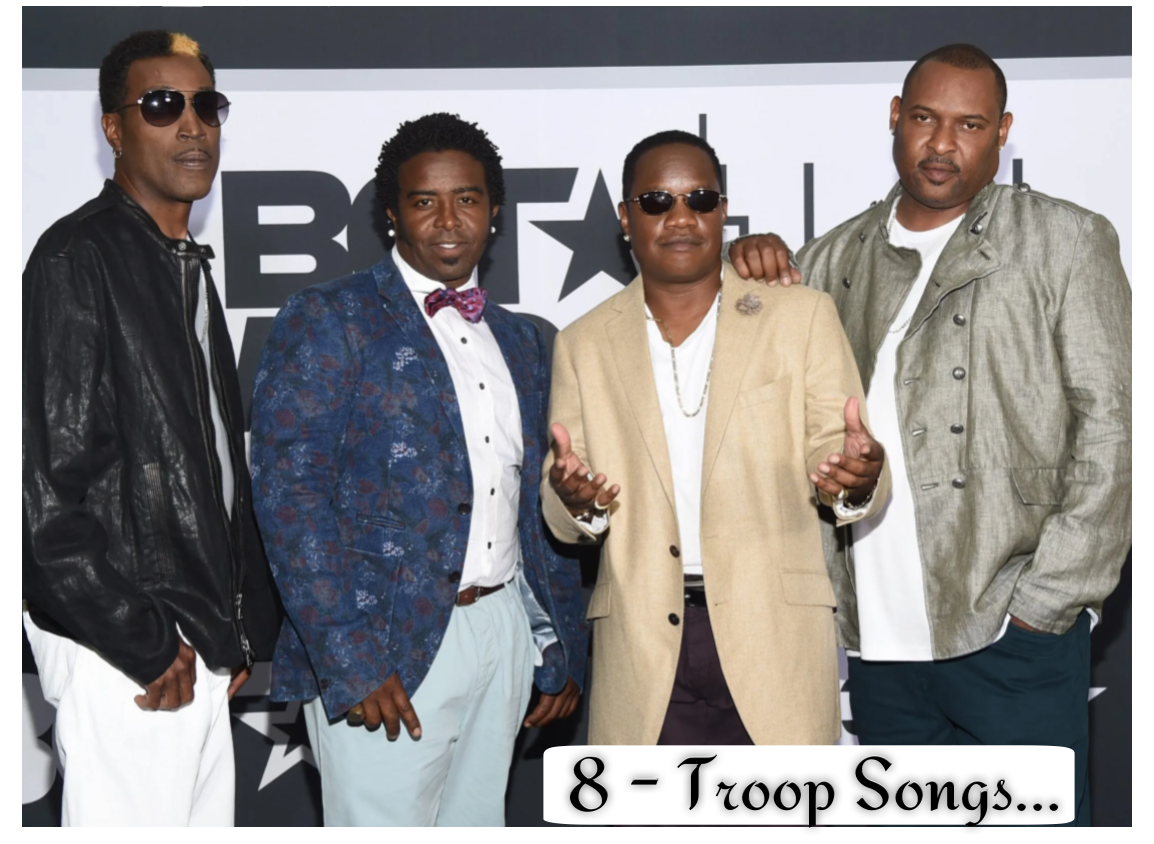(ThyBlackMan.com) Few R&B groups from the late 1980s and early 1990s managed to blend vocal precision, stage charisma, and emotional depth quite like Troop. Hailing from Pasadena, California, the five-member ensemble—Steve Russell, Allen McNeil, Rodney Benford, John Harreld, and the late Reggie Warren—carved out a distinctive space during the rise of new jack swing and urban contemporary soul. With tight harmonies, dynamic performances, and a deep bench of slow jams and dancefloor-ready hits, Troop stood at the forefront of a generation that bridged the polished showmanship of the past with the progressive edge of R&B’s future.
While they achieved chart success with No. 1 singles like “Spread My Wings” and “All I Do Is Think of You,” their catalog extends well beyond the hits. Their albums offered a range of moods—from romantic ballads to introspective narratives and bold, funk-infused anthems. Each track in this curated selection showcases a different facet of Troop’s artistry, demonstrating why they remain a revered name in classic R&B circles and a group worth rediscovering for today’s listeners.
Here are eight Troop songs every R&B fan—new or seasoned—should take the time to experience.

1. “All I Do Is Think of You”
Troop’s rendition of “All I Do Is Think of You”—originally performed by the Jackson 5—is arguably one of the finest R&B covers of all time. Released in 1989 as part of their sophomore album Attitude, the song marked a turning point for the group, introducing a level of maturity and emotional depth that solidified their place in R&B history. It wasn’t just a nostalgic throwback; it was a declaration of Troop’s arrival as masters of their vocal craft.
Where the Jackson 5 version was youthful and sweet, Troop’s cover is lush, romantically intense, and richly arranged. Steve Russell’s lead vocals take center stage with an aching sincerity that radiates through every line. The tenderness in his delivery, backed by the group’s impeccable harmonies, transforms the song from a teen crush anthem into a full-blown soul ballad. It’s not merely about young love—it’s about consuming love, the kind that monopolizes your thoughts and lingers in your chest.
One of the most captivating aspects of this track is the group’s vocal arrangement. Each harmony is carefully placed, enhancing the emotional build-up without ever feeling cluttered or overproduced. The background vocals serve as a supportive cushion for Russell’s lead, adding dimension and resonance. It’s the kind of performance that reveals more with every listen—the nuance, the technique, the emotion all working in tandem.
Sonically, the production benefits from late ’80s studio techniques—echoed snares, ambient pads, warm synths, and subtle guitar licks that glide gently behind the vocals. There’s a cinematic quality to the song; it feels like a soundtrack to the kind of love story that never fades, even if it never fully materializes. The bridge, in particular, soars with an emotional climax that few groups of that era could execute with such finesse.
Even in today’s world of digital filters and over-processed ballads, this song still resonates because of its raw emotionality and timeless arrangement. Younger artists like Giveon or Lucky Daye could easily cite this track as an influence—it bridges the innocence of classic Motown with the depth and polish of modern soul. It’s a testament to the power of a great vocal group breathing new life into a beloved classic while making it wholly their own.
“All I Do Is Think of You” remains one of Troop’s defining moments. It captured their ability to reinterpret a well-known song and elevate it without compromising the original’s heart. For fans of slow jams, soul ballads, and rich vocal performances, this track is an essential listen that continues to inspire generations.
2. “Spread My Wings”
From the same Attitude album comes “Spread My Wings,” a No. 1 R&B hit that reflects Troop at their artistic peak. Written and produced by Chuckii Booker, the song is a coming-of-age anthem about love, growth, and spiritual elevation. It has the soft glide of a lullaby and the lyrical soul of a motivational mantra, rendered in velvety harmonies and anchored by an ethereal groove.
Lyrically, “Spread My Wings” touches on the need to explore and evolve emotionally while still being tethered to love. The titular line, “I’m gonna spread my wings and fly away,” is not a declaration of escape but of becoming. It’s about moving forward while holding love close, a message that resonates deeply with listeners at transitional stages in their lives. The lyrics feel like pages from a journal—intimate, searching, hopeful.
Musically, the track is a masterstroke in subtle production. The intro opens with a synth bed that feels like sunrise over a quiet cityscape. The drums are programmed but soft, and the keys wash over the beat like waves. Troop’s vocals sit perfectly in this arrangement, never overwhelmed by the instrumentation. The call-and-response structure creates a communal feel, as if the group is singing both to the listener and to one another.
What also stands out is the control in the vocal performance. The song doesn’t rely on vocal acrobatics to make an emotional impact. Instead, it’s the restraint that gives it power. The harmonies are warm and soothing, but beneath them is a quiet strength. Steve Russell’s tone is reflective, and he delivers the verses like personal revelations rather than performance. It’s that intimacy that makes “Spread My Wings” feel almost sacred.
In today’s climate, where self-growth and mindfulness are at the forefront of the cultural conversation, “Spread My Wings” remains incredibly relevant. It’s the kind of song you turn to when you’re on the edge of a new chapter—leaving a job, ending a relationship, or stepping into a new identity. Its message of emotional liberation, wrapped in heavenly harmonies, still feels empowering decades later.
“Spread My Wings” isn’t just a great song—it’s a timeless one. It’s one of those tracks that lingers with you, not just because of how it sounds but because of how it makes you feel. It invites the listener to not only hear the message, but to live it.
3. “Sweet November”
“Sweet November” is another gem in Troop’s catalog that’s criminally underrated in broader R&B retrospectives. Written by Babyface and L.A. Reid, the track appears on the group’s third album, Deepa, and is a masterclass in slow jam elegance. The song brims with warmth, nostalgia, and heartbreak, woven together with masterful precision.
The song is a reflective and melancholic tale of a love that blossomed and faded during a single, unforgettable November. The poetic use of the month as a metaphor for change and impermanence gives the song an autumnal texture. Lyrics like “Love should have brought you home last night” linger with that uniquely Babyface-esque poignancy, while Steve Russell’s delivery captures every ounce of emotional residue.
What makes “Sweet November” particularly striking is its emotional patience. The track doesn’t rush its resolution. Instead, it gently meanders like a conversation you don’t want to end. The subtle shifts in chord progressions mirror the shifting dynamics of the relationship it describes. There’s a longing in every phrase that feels earned, not fabricated—a rarity in a genre often saturated with hyperbole.
Instrumentally, it’s subtle and sophisticated. The production is minimalistic yet rich, allowing Troop’s harmonies to carry the emotional weight. There’s an ache in every note, and the background harmonies act like a Greek chorus, echoing the heartbreak of the main narrative. The clean guitar licks, soft keyboard layers, and understated drum programming work together to create a mood of wistful intimacy.
“Sweet November” feels like the musical equivalent of a handwritten love letter—private, cherished, and bittersweet. It doesn’t just capture a romantic moment; it bottles the afterglow and the ache of its passing. This is R&B at its most literary, where emotion and craft walk hand-in-hand.
Even in today’s genre-blending music landscape, “Sweet November” would find a home among tracks by Jazmine Sullivan or Snoh Aalegra. It’s a reminder that the heart still wants what it wants—and sometimes what it wants is to revisit a love that lived and died in a single, unforgettable month.
4. “Mamacita”
Troop’s debut single “Mamacita” introduced the world to their energy, swagger, and charisma. Released in 1988, this track is the ultimate throwback to the early days of New Jack Swing, when R&B was finding new life in syncopated drum machines and hip-hop-inflected beats. It marked the moment Troop declared themselves ready for the spotlight—and the world responded.
With its infectious beat, playful lyrics, and slick danceability, “Mamacita” was designed to get people moving. It’s a flirtatious number that isn’t shy about its intentions. While the group would later master romantic ballads, this track captured the spirit of youthful excitement. The term “Mamacita” was exotic and affectionate, giving the song an accessible, multicultural flair that made it a hit with a wide audience.
Vocal-wise, “Mamacita” may not showcase the full extent of Troop’s range, but it highlights their chemistry and personality. There’s a confident bounce to their phrasing, a street-corner swagger that was rare in a genre often dominated by smoother crooners. Their harmonies are still tight, but here, they let their charisma lead. You can hear the joy of performance in every line, which makes the song endlessly replayable.
From a production standpoint, it leans heavily into late ’80s tropes: funky synth bass, sharp snares, and tempo-driven vocal hooks. But instead of sounding dated, these choices now serve as nostalgic markers of a vibrant musical era. It’s the kind of track you throw on at a cookout, in a roller rink, or during a retro set and instantly light up the room.
Culturally, “Mamacita” also helped set Troop apart from their contemporaries. It was a bold debut that said, “We’re not trying to be the next anyone—we’re building our own lane.” That identity continued to shape the group’s sound in later years, but “Mamacita” remains a statement of origin—a flash of brilliance that still beams decades later.
Today, the track holds up as both a fun dance tune and a historical snapshot of a pivotal moment in Black music. It’s Troop’s youthful fire in audio form. And for those discovering them for the first time, “Mamacita” is the perfect way to feel their original spark.
5. “I Will Always Love You”
Not to be confused with the Dolly Parton-penned and Whitney Houston-popularized song of the same name, Troop’s “I Will Always Love You” from their Attitude album is a different beast altogether—one rooted in heartache, vulnerability, and passionate devotion. The group tackled themes of separation and unconditional love with remarkable poise, crafting a ballad that speaks to the enduring nature of true emotional connection.
This song captures the soul of classic R&B balladry with a sincerity that pierces through. Troop’s vocals here are solemn yet comforting, expressing unshakable love even in the face of separation. “This will be the night I treasure / Forever as my memory of you” they croon, with a maturity that belies their youth at the time. It’s not about bitterness or blame—it’s about accepting love’s course, even when it doesn’t follow the path we desire.
What makes this ballad stand out is its emotional restraint. Rather than unleashing high notes for the sake of drama, Troop opts for controlled, heartfelt delivery. The harmonies are used to underscore emotional weight rather than over-decorate the track. There’s a sobering stillness in the song that feels honest and brave. It’s the kind of song that acknowledges that love and loss often walk side by side.
The instrumental arrangement is delicate, featuring subdued keyboard melodies, faint percussion, and ambient textures that wrap the vocals like a warm blanket. It’s one of those tracks where the silence between notes carries as much emotion as the notes themselves. The harmonies swell in all the right places, creating an emotional crescendo that lingers after the song ends. You can hear the reverence in their voices—it’s a love letter sent without expectation of a return.
What also sets this track apart is its timelessness. In an era where vulnerability in R&B is finally being celebrated again, this track feels more relevant than ever. You could imagine artists like Leon Thomas or Brent Faiyaz reinterpreting this song for a new audience and still preserving its power. For listeners going through heartbreak or needing a moment of emotional catharsis, Troop’s “I Will Always Love You” offers the perfect soundtrack—a rare blend of tenderness and truth.
Ultimately, this song is a deep cut that deserves a place among the best R&B ballads of the late ’80s and early ’90s. It’s a quiet masterpiece—one that showcases Troop’s sensitivity, vocal control, and emotional intelligence in the most elegant way possible.
6. “That’s My Attitude”
A high-energy banger from their Attitude album, “That’s My Attitude” is a braggadocious track that blends the cockiness of hip-hop with the polish of R&B vocals. It’s Troop at their most confident, and the song serves as a statement of independence, self-respect, and unapologetic identity. From the opening beat, you know this isn’t your average love song—this is a declaration of dominance.
With a pounding beat, funky bassline, and rap-inspired cadences, this song showcased their ability to evolve with the changing musical landscape. It wasn’t all love ballads—Troop could bring the edge too. Steve Russell’s lead performance is filled with vocal charisma, and the call-and-response between the members gives it a dynamic, almost theatrical feel. The track rides the new jack swing wave, but it’s laced with more attitude, more rhythm, and a bit of rebellious swagger.
The lyrics are a flex—plain and simple. Lines like “Telling me, don’t be cruel / Hey baby that’s my attitude” reinforce a message of staying true to yourself in the face of doubt or opposition. The song became an anthem for self-confidence and individuality, especially for young listeners finding their voice. In a musical era defined by conformity and formulaic hooks, “That’s My Attitude” was a breath of fresh, self-assured air.
Musically, the production leans into its assertiveness with layered drum programming, aggressive synth stabs, and a rhythm that feels made for dance battles and talent shows. It’s fast, funky, and fearless. But what elevates it is that Troop never loses their vocal polish amidst the swagger—they harmonize with clarity and style, proving they can party with the best of them without abandoning their roots.
Today, “That’s My Attitude” would thrive in a playlist alongside Bobby Brown’s “My Prerogative” or Bell Biv DeVoe’s “Poison.” It’s a reminder that self-expression, especially for Black male vocal groups, wasn’t always about softness—it was also about owning your space and making no apologies for who you are.
For fans of Troop, this song is essential listening. It demonstrates their range—not just vocally, but in terms of persona and musical ambition. It’s loud, proud, and full of that youthful hunger that made early ’90s R&B such a vibrant force.
7. “Deepa”
The title track from their third studio album, Deepa, represents a departure from Troop’s polished love songs, diving into a more sensual and introspective space. This isn’t a track about surface-level attraction; it’s about the emotional and spiritual depths of love—the intimacy that forms when two souls connect beyond physical desire. It showcases a level of maturity in both sound and subject matter that reflects the group’s growth by their third album.
Musically, “Deepa” is smooth and layered. The slow tempo allows every vocal run and adlib to resonate fully, creating a luxurious texture that feels immersive and intentional. The production includes a sensual bassline and airy keys that allow the harmonies to glide effortlessly. Unlike their more uptempo singles, this track moves slowly and confidently, rewarding listeners who allow the mood to fully sink in.
Troop’s vocal execution is especially noteworthy here. Steve Russell’s lead is silky and emotive, while the backing harmonies subtly swell to create depth. The group’s unified delivery gives the song a sense of intimacy and closeness—like a late-night conversation between lovers. It’s the type of R&B that doesn’t shout for attention but demands it through finesse and sophistication.
Lyrically, the song explores love that’s not just about physical connection but also emotional resonance. The metaphors used are poetic and suggestive without being explicit, showing restraint and class in their songwriting. The emotional core is about connection—how deeply two people can bond when both are emotionally available.
For today’s R&B fans—especially those who admire the smooth, experimental textures of artists like Miguel, D’Angelo, or Snoh Aalegra—“Deepa” will feel right at home. It was ahead of its time in its sensitivity and sonic landscape, and it deserves to be rediscovered as one of Troop’s most nuanced and elegant recordings.
Ultimately, “Deepa” is a quiet triumph that highlights Troop’s versatility and emotional intelligence. It reflects the kind of grown and sexy R&B that has aged gracefully and continues to resonate with listeners seeking music that feels both intimate and introspective.
8. “I’m Not Gamin’”
Closing out this list is “I’m Not Gamin’,” a standout track from the Deepa album that balances streetwise attitude with heartfelt sincerity. It’s a bold statement about emotional clarity in romantic relationships—emphasizing honesty, integrity, and respect. The track offers a refreshing perspective on modern love, focusing on communication over confusion.
Musically, the song leans into a slightly harder-edged production than Troop’s earlier ballads, integrating elements of early ’90s hip-hop-influenced R&B. The beat is crisp and assertive, backed by smooth synths and layered harmonies that retain the group’s signature polish. There’s a rhythmic tension here that makes the message even more impactful—it’s not just a slow jam; it has presence.
Vocally, the group finds the perfect balance between assertiveness and warmth. The lead vocals are delivered with conviction and clarity, while the harmonies gently support the message without overshadowing it. There’s a conversational quality to the performance, making the song feel like an honest exchange between lovers, rather than just a performance for the listener.
Thematically, the song touches on emotional boundaries and the desire for transparency in love. It takes a firm but respectful stance on emotional gamesmanship, making it especially relatable in a time when many still struggle with ambiguity in relationships. The track speaks to the kind of maturity that often comes with hard-earned romantic experience.
“I’m Not Gamin’” remains relevant in today’s R&B landscape, where themes of emotional honesty and relational accountability are more celebrated than ever. Artists like Brent Faiyaz, BJ the Chicago Kid, and Giveon operate in a similar thematic space, though Troop did it decades prior with classic finesse.
As a closing track in this selection, “I’m Not Gamin’” underscores the depth and range Troop brought to their music. They weren’t just entertainers—they were storytellers, capable of addressing love from every angle, including the honest and sometimes uncomfortable truths. This track is a bold reminder that R&B at its best is both beautiful and brutally honest.
Troop’s discography is a testament to the richness and versatility of late 20th-century R&B. Whether expressing unguarded vulnerability, affirming self-confidence, or capturing the sweet ache of love lost, the group consistently delivered with vocal excellence and emotional honesty. Their music spoke to the teenage heart, the grown adult soul, and everything in between—bridging generational gaps through timeless melodies and meaningful lyrics.
As music continues to evolve and genre lines blur, there’s immense value in revisiting artists like Troop who helped shape the foundation of modern R&B. The eight songs featured here offer not only a nostalgic trip for longtime fans but also a fresh and rewarding discovery for those just beginning to explore the era. With their harmonies still echoing in today’s soundscapes, Troop proves that great music doesn’t fade—it simply waits to be rediscovered.
Staff Writer; Jamar Jackson

















Leave a Reply